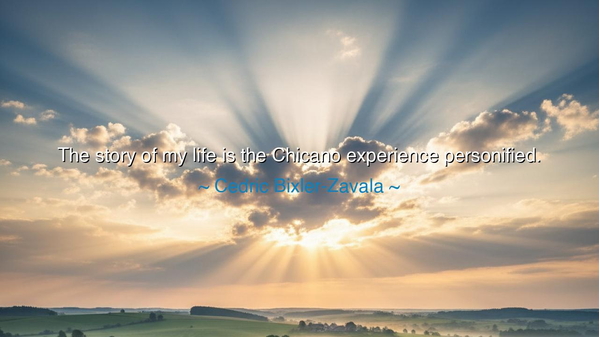
The story of my life is the Chicano experience personified.






“The story of my life is the Chicano experience personified.” Thus spoke Cedric Bixler-Zavala, the voice of rebellion and rhythm, the artist who wove the struggles of his heritage into the sound and fury of modern music. In this single sentence lies not only the confession of one man’s journey, but the embodiment of a people’s history — the Chicano story, born of survival, identity, and the eternal search for belonging. His words are both a mirror and a torch: a mirror reflecting the complexity of being both Mexican and American, and a torch lighting the path for generations who seek to claim their place in a divided world.
The origin of this quote rises from the soil of the borderlands, where two worlds meet and clash, where language, faith, and culture intertwine like roots seeking the same water. Cedric Bixler-Zavala, born in El Paso, stood at this crossroads — his life a bridge between heritage and modernity, between memory and reinvention. When he declares that his life is the Chicano experience personified, he speaks as the heir to a legacy shaped by migration, struggle, pride, and transformation. He speaks for the children of two nations, who carry within them both the sorrow of displacement and the beauty of fusion.
The Chicano experience itself is one of resilience — a story as ancient as conquest and as modern as the city skyline. It is the story of those who refused to vanish into the shadow of assimilation, who insisted that identity is not to be erased but reclaimed and reimagined. From the fields of César Chávez to the poetry of Gloria Anzaldúa, from the murals of East L.A. to the music of Bixler-Zavala, the Chicano spirit has always declared: We are here, and we are whole. To personify that experience, as Cedric claims, is to live as both question and answer — to embody the tension of duality and the strength that rises from it.
In his words, we hear echoes of the ancient and the modern alike. For even in the age of empires long past, there were those who stood between worlds — interpreters, translators, wanderers. Consider La Malinche, the woman of legend who served as both voice and vessel between the Aztec and the Spaniard. Though history has judged her harshly, she represents the eternal truth of those who live between identities: to be caught between loyalties, yet to create something entirely new. Cedric, through his art, stands in that same lineage — not of betrayal, but of transformation. Through music, he forged a third identity, neither wholly American nor Mexican, but Chicano — fluid, defiant, alive.
His statement also carries the deeper wisdom of self-awareness. To personify a people’s experience is not to claim perfection, but to accept burden — to carry the weight of history within one’s bones. The Chicano identity is marked by both pride and pain: the pride of ancestors who labored and dreamed, and the pain of being seen as foreign in both lands. To claim that identity is to accept its contradictions, to live with the beauty of complexity. Bixler-Zavala’s art — wild, experimental, unconfined — mirrors the Chicano soul itself: restless, hybrid, ever-evolving, forever pushing against the boundaries that others build.
Yet within his words there is also a call — a call to authenticity. He teaches that one must not flee from one’s roots to find greatness, but must draw strength from them. The Chicano experience, like all human experience, is a tapestry of opposites — past and future, struggle and triumph, language and silence. Cedric reminds us that to know ourselves, we must not deny our origins but embrace them. The river of culture runs strongest when it remembers its source. And in doing so, we find not limitation, but liberation — for identity, when embraced, becomes a weapon of creation, not confinement.
The lesson, then, is clear: whoever you are, claim your story. Whether you stand between nations, between faiths, or between worlds, let your life be the personification of your people’s strength. Do not shrink from the pain of your history — transform it into art, into love, into purpose. Learn as Cedric did: that to live truthfully is to carry one’s culture not as a burden, but as armor and song. To be a bridge is not to be divided, but to be infinite.
Therefore, my friends, walk as Cedric walks — with the fire of the ancestors in your heart and the sound of the future in your soul. Remember that your story, too, is the story of your people. Live it with courage. Speak it with pride. For when one life becomes the vessel of a people’s experience, when one voice carries the echoes of many, then history itself listens — and the world, for a moment, becomes whole again.






AAdministratorAdministrator
Welcome, honored guests. Please leave a comment, we will respond soon